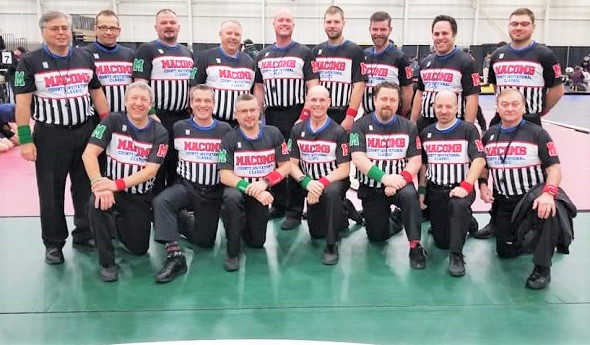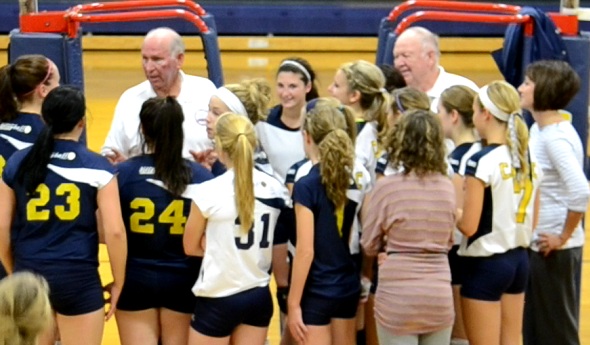
The Official View: Don't Make it Personal
By
Brent Rice
MHSAA Assistant Director
January 15, 2019
By Brent Rice
MHSAA Assistant Director
Statistics tell us poor sportsmanship is a leading factor in officials leaving officiating and a major impediment to recruiting new officials. The official catching flak is not new.
This week’s “It’s Official” discusses work being done to bring civility to high-intensity situations where criticism of officials has frequently turned personal.
It’s Official!
Poor Sportsmanship and the Official
 As long as there have been officials, there has been dissatisfaction with officials by players and coaches. It’s not that instances of poor sportsmanship are becoming more frequent – it’s that these instances are becoming more personal. And in part because of the accessibility of social media, they are more sensationalized.
As long as there have been officials, there has been dissatisfaction with officials by players and coaches. It’s not that instances of poor sportsmanship are becoming more frequent – it’s that these instances are becoming more personal. And in part because of the accessibility of social media, they are more sensationalized.
The great Major League Baseball veteran umpire Harry Wendelstedt regularly used to say, “You may yell at the uniform, but you can’t yell at me.” His point recognizes not everyone will agree with the calls officials make, but that criticism and disapproval should be directed about the call and not about the person.
Some sports have ejectable offenses specific to that sport. Others – think soccer, volleyball, basketball or football – have a progressive system of fouls that lead to an automatic ejection. This doesn’t mean, though, that coaches and players receive a one-time free pass to say whatever they want. Personal attacks are not permitted and are grounds for immediate disqualification. Personal attacks include:
• Offensive or derogatory remarks about an official’s (real or perceived) gender, ethnicity, sexual orientation, age, religion or disability.
• Threats or intimidation of physical violence, withdrawing games or a downgrade of ratings.
• Personal insults that disparage an individual or openly question an official’s integrity, impartiality, honesty or character.
For example, instead of using the personal insult “You’re terrible!” that would result in an immediate ejection, players and coaches could substitute the impersonal “That’s terrible!” The use of “you” or “you’re” personalizes the attack, and anything that follows those words in a disparaging manner almost always will result in a disqualification.
While the onus of ensuring good sportsmanship is primarily the responsibility of administrators, coaches and players, the officials also play a significant role by enforcing behavior and conduct rules through penalization. Officials are being instructed to strictly enforce this policy moving forward. To emphasize the importance of avoiding personal attacks on officials, the MHSAA will be starting the new campaign “Get Personal … Get Ejected!” We are looking for help from coaches, players and spectators in showing respect and appreciation for the hardworking men and women who officiate MHSAA contests by keeping criticisms brief and absent of personal attacks.
 Sports Officials Appreciation
Sports Officials Appreciation
The MHSAA is seeking ways we can show appreciation for the contribution Registered officials provide to the MHSAA and its member schools. This will soon include the introduction of an “Official Thanks” campaign and providing schools a framework to institute “Officials Appreciation” events.
To further express our gratitude, the MHSAA has partnered with the Detroit Red Wings to host a Sports Officials Night on Sunday, March 31 beginning at 7:30pm. The package includes a specially-priced Red Wings ticket, souvenir cooling towel and access to a pre-game speaking engagement with former professional officials. Additional benefits also are being worked on. Details are posted on the Officials page of the MHSAA website and will be delivered to all officials via email.
Rule of the Week
GIRLS COMPETITIVE CHEER As Team A attempts a swinging stunt during Round 3, the flyer is propelled into an almost-vertical position with her feet in the air and head near the floor.
Ruling: This is an illegal stunt and an 8-point deduction per infraction.
It’s Your Call
BASKETBALL This week’s clip shows Team A in white attempting to move the ball up court against Team B’s press. A pass is made to #11 near the division line. What’s the call?
Last IYC Ruling: In the last “It’s Your Call” clip, the attacking wrestler picks up his opponent and slams him to the mat. This is a dangerous act, and a flagrant misconduct should have been assessed. (Click to see video.)
Official View: Giving Back
Every year, the Macomb County Coaches Association and area officials come together to host a Christmas Tournament where funds are raised for educational scholarship opportunities. This year’s event was another huge success.
For officials, it’s a great time to give back and enjoy the sport they love. Tradition has been that custom uniform shirts are purchased for the officials, who also wear their best (or worst) pair of Christmas socks.
Pictured above are: (Back row) Phil Lieblang, Lenny Gino, Chad Davinich, Dave Hall, Bryan Legree, Josh Orzechowski, Mike Billiu, Matt Stabley, Brandon Orzechowski. (Front row) Eugene English, Gary Kowalewski, Jerry Angelo, Ron Minoletti, Rob Peltier, Eric Siefert, Jim Niemiec.

90 Years of Making the Right Calls
November 7, 2012
By Geoff Kimmerly
Second Half editor
Beryl Hager read something about officiating recently that struck him.
People will never forget a bad call, and they’ll never remember a good one.
“That’s the way it is,” the longtime official from Marlette said. “Realistically, everyone makes a bad call.”
But the calls, good and bad, are not what Hager and longtime partner Vern Geister will remember most from their combined 90 years in Michigan high school athletics, which "tentatively" came to an end this fall.
The former high school classmates have a standing dinner double date with their wives. When that time comes, they’ll each celebrate more than four decades as MHSAA officials, including many years working side-by-side on the football field and most recently the volleyball court.
Hager, 74, has been an official since 1967 – a stretch of 46 years. Geister, 81, served his 44th this fall.
Frequently working five days a week over the decades, they've facilitated hundreds of games and benefited thousands of athletes, mostly in the Thumb area. They've officiated Capac’s volleyball invitational over the tenures of three athletic directors. Hager worked basketball games in the school’s Harry C. Moore Gymnasium when Moore was the basketball coach – Moore died in 1986.
“They have just great attitudes. They’re always wonderful with our kids,” Capac athletic director Arnie VandeMark said. “And you just wouldn't believe the stories they told us. They've been here a long time.”
A book full of memories
Hager wishes he’d kept a diary of his officiating career, which began in 1967.
Some of his most vivid memories are perhaps not what you’d expect.
“I saw some dreadful injuries,” he said. “I saw a young man break a thigh bone, and he was in shock and didn't feel any pain. One night at a volleyball match, a girl broke her ankle, came down on somebody’s foot. One night at a basketball game, two guys were playing and one jumped up and the other was behind him, trailing him, and four teeth went flying through the air. The front one came down on his back, the other came down on his face. Both were out.”
But the far greater number of his football, basketball, volleyball and baseball games were without incident – just as an official would have them.
Hager always enjoyed sports. He was involved in Little League baseball and has taught Sunday school at his church for 55 years. Officiating seemed a great way to blend his enjoyment of sports and people.
Plus it worked into his schedule. He could pick up games that didn't conflict with his jobs in farming and later facility maintenance. His son graduated in 1983, and aside from one half of one football game, he didn't miss an event. For a short while at the start, Hager's his wife Lois officiated with him.
He also was among pioneers in one of his sports, officiating volleyball from its MHSAA start in 1976. He’s worked a number of District tournaments and a handful of Regionals over the years – and like many things over 45 seasons, watched that sport come a long way.
“I didn't know anything about it. Nor did anyone else,” Hager said. “It’s changed tremendously in the last 35 years. When we started, if they could get the ball over the net, and hit it back, we were doing really well. Now, one guys told me volleyball is not a game. It’s a science.”
A natural fit
Geister really wanted to coach.
He’d done so for his son’s little league baseball team for five years, but knew his chances to continue were few. At that point in time during the 1950s, nearly all coaches also were teachers.
Before retiring in 1997, Geister worked first in the mobile home industry, then for the Kroger company before serving for more than 16 years as a Sanilac County magistrate. Officiating seemed like the next best way to stay involved with athletics.
“It was kind of a natural thing to get started,” he said.
“I think it makes you feel younger than you really are, just being with the athletes.”
Geister, who had caught for the Marlette baseball team before graduating in 1949, began officiating that sport before picking up football, basketball, softball and eventually volleyball. He got heaviest into that last after a knee replacement in 1997 made it difficult to keep up on the football field and basketball court.
But he did have a chance to officiate at the highest high school level, working the 1983 Class D Football Final at the Pontiac Silverdome between St. Ignace and Mendon. Geister also officiated Semifinals and some high-level baseball playoffs.
One football Regional sticks out most. Elkton-Pigeon-Bay Port and now-closed Detroit DePorres matched up at Flint’s Atwood Stadium. A storm had come through and dropped a good amount of snow. That was cleared, but a sheet of ice was left behind.
Back then, four people made up an officiating crew – now it is five – which would've made keeping up with the players pretty tough. The good news, perhaps, was that the players had a hard time keeping upright on the slippery turf as well.
Remembering a third partner
Geister said for him, the best part of officiating has been the friends he’s had the opportunity to make and maintain over the years.
They'll always remember a third partner who died in 1978.
Classmate Andy McSkulin had been a freshman at Marlette when Geister was a senior in 1948-49 and a senior when Hager was a freshman. He became an MHSAA official around the same time those two started up.
The three did a number of games together and worked on the same football crew at times. They knew each other well before, but got to know each other even better.
Hager has never gotten riled easily, and gave out only a few technical fouls over the years. But he remembered working a basketball game with McSkulin during which his partner knew Hager was about to assess one – McSkulin “said he could see the fire in my eyes.”
More to come?
For the last 15 seasons, Hager and Geister have worked volleyball matches together. They bring a professional but fun atmosphere to their games.
They’re known for joking with each other. They've never had an argument.
And although Geister doesn't completely agree, Hager said he and his partner’s retirement is only tentative. They've discussed coming back for a few junior varsity or junior high games next fall.
Neither belongs to a local officials association or has a computer. But both have still gotten calls from local athletic directors like VandeMark, who appreciate their knowledge and approach in working their games.
“I think what you enjoy is having the respect of the players and coaches,” Geister said. “I think you get to the point where it’s the pride of feeling you've done your best, done a good job and that they appreciate it.”
PHOTO: Officials Beryl Hager (left) and Vern Geister are congratulated by members of the Capac freshman, junior varsity and varsity volleyball teams while being honored for their combined 90 years of service during a match last month. (Photo courtesy of Capac athletics.)

